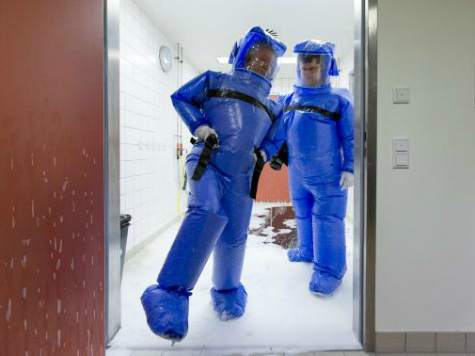A debate is erupting among scientists as to how severe the problem of Ebola in West African countries such as Guinea, Sierra Leone, and Liberia will become in the coming months.
Scientists from the World Health Organization are trumpeting claims from the U.S. Centers for Disease Control and Prevention (CDC) that there could be 21,000 cases of Ebola in six weeks, an exponential growth from the estimate of 5,800 cases in the last six months. On Tuesday, the U.S. Centers for Disease Control and Prevention is rumored to release predictions for Liberia and Sierra Leone, but the CDC acknowledges that its estimates are based on the idea that Ebola cases have been underreported. The CDC also makes the astonishing prediction that there could be 550,000 to 1.4 million cases by late January.
Yet Christopher Dye, WHO’s director of strategy and study co-author, said the prognostications were not exactly fixed. “We’re beginning to see some signs in the response that gives us hope this increase in cases won’t happen,” he said. “This is a bit like weather forecasting. We can do it a few days in advance, but looking a few weeks or months ahead is very difficult.”
Doubt was also cast on the harsh predictions by others; Dr. Richard Wenzel, a Virginia Commonwealth University scientist who used to head the International Society for Infectious Diseases, said that those numbers seem “somewhat pessimistic” and do not factor in already existing infection control efforts.
Dr. Armand Sprecher, an infectious diseases specialist at Doctors Without Borders, said, “It’s a big assumption that nothing will change in the current outbreak response. Ebola outbreaks usually end when people stop touching the sick. The outbreak is not going to end tomorrow but there are things we can do to reduce the case count.” Sprecher added that Ebola could imitate other diseases that persist in the environment by evolving to become less deadly or contagious.
Local health officials are trying to teach natives to avoid touching the sick or the dead.
There are some backing the predictions of the CDC; Adam Kucharski, a research fellow in infectious disease epidemiology at the London School of Hygiene and Tropical Medicine, said, “The window for controlling this outbreak is closing.”
Last week, the U.S. announced it was sending 3,000 troops to help combat Ebola and also build 11 treatment centers in Liberia; this announcement was joined by Britain and France promising to build treatment centers in Sierra Leone and Guinea. The World Bank and UNICEF have already given over $1 million worth of supplies to the region.

COMMENTS
Please let us know if you're having issues with commenting.